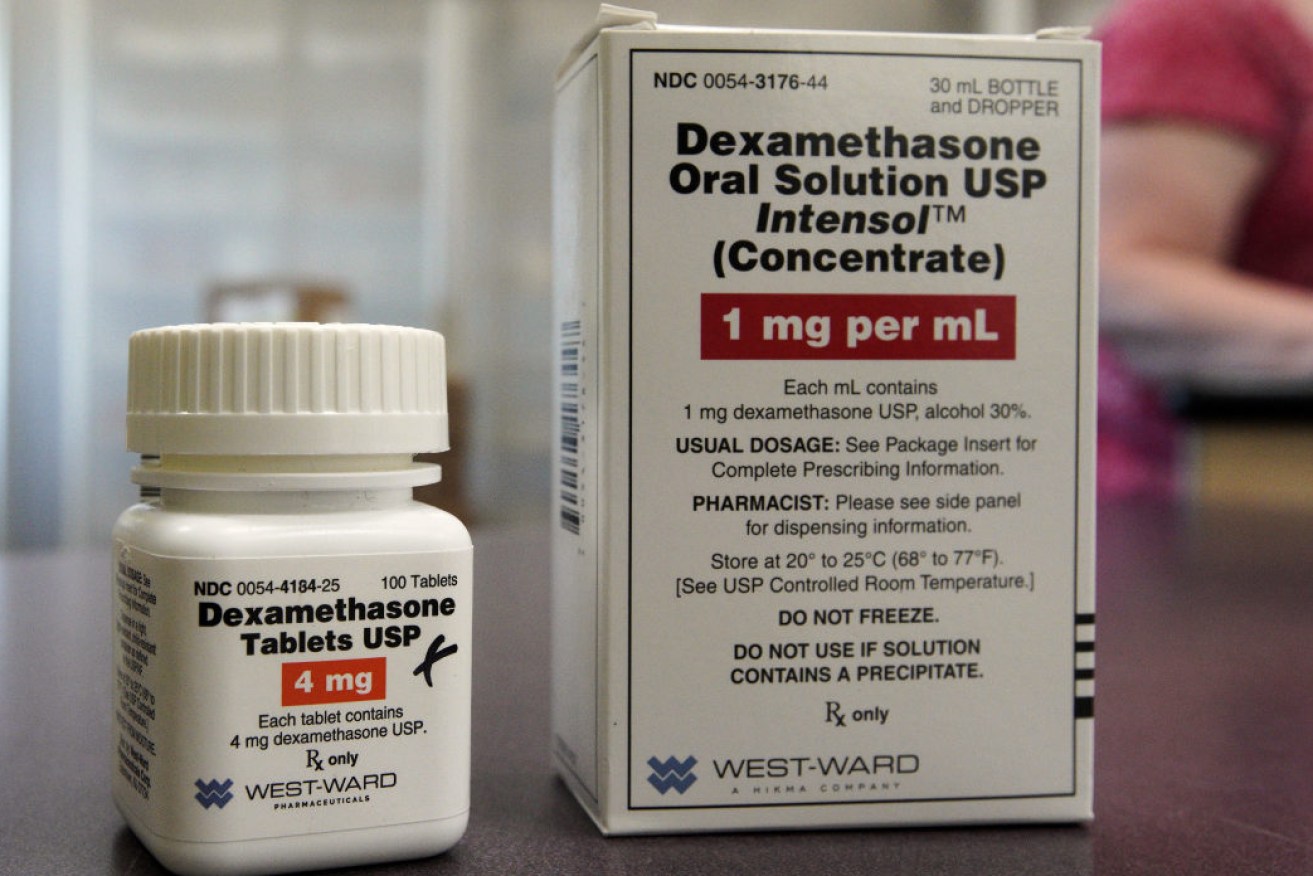Explained: How does the breakthrough coronavirus medicine, Dexamethasone, work?


The steroid dexamethasone is being used to treat severely ill COVID-19 patients. Photo: AAP
A cheap steroid has been hailed a game-changer in the fight against the coronavirus, with scientists claiming it will stop people dying.
But what is it exactly and how does it work?
Dexamethasone is a popular anti-inflammatory medicine used to treat a range of conditions like rheumatoid arthritis or lung disease.
On Thursday morning (Australian time), World Health Organisation chief Tedros Adhanom Ghebreyesus said dexamethasone should be reserved for “seriously ill and critical patients who can benefit from this drug clearly”.
He said the research by Oxford University was at last providing “green shoots of hope” in treating the virus.
“This is the first treatment to be shown to reduce mortality in patients with COVID-19 requiring oxygen or ventilator support,” Dr Tedros said in a statement late on Tuesday.
“WHO will co-ordinate a meta-analysis to increase our overall understanding of this intervention. WHO clinical guidance will be updated to reflect how and when the drug should be used in COVID-19,” the agency added.
Dexamethasone has been around since the 1950s and is similar to the steroid cortisone, which is often used to ease swelling or joint pain.
There are two huge benefits: It’s cheap and it’s widely available.
In Australia, the medicine is strictly controlled and is prescription-only though readily stocked in pharmacies and hospitals.
However, it is only effective at treating seriously ill COVID-19 patients.
WHO welcomes the initial clinical trial results from the #UnitedKingdom that show #dexamethasone, a corticosteroid, can be lifesaving for patients who are critically ill with #COVID19 👉 https://t.co/CmNea2XEKH
— World Health Organization (WHO) (@WHO) June 16, 2020
Justin Denholm, Associate Professor at the Peter Doherty Institute for Infection and Immunity, said if you’ve only got mild symptoms like a runny nose or a sore throat, it wouldn’t be effective.
“This medication works by reducing inflammation,” Associate Professor Denholm told The New Daily.
“The sickest people – those in intensive care needing ventilators – those were the ones getting the most benefits from it.”
And these benefits will save lives, according to the scientists at Oxford University who conducted trials of dexamethasone.
It could save one in every eight coronavirus patients on ventilators, and drastically reduce the risk of death of the most severely ill, they claim.
https://twitter.com/UniofOxford/status/1272922802752978957?cxt=HHwWmoCwye-iqqojAAAA
A drug that reduces the number of people dying from COVID-19 is “a big deal”, Associate Professor Denholm said.
“If it all checks out, this is the first drug that has been shown to actually improve mortality,” he said.
“Of everything else people have studied like Remdesivir and hydroxychloroquine, none of them have shown they have prevented people from dying.”
What are the downsides?
Steroids weaken the immune system, making it harder for your body to fight off an infection.
“If someone has got an active infection and you suppress their immune system, they could lose control of the infection and be a lot worse off,” Associate Professor Denholm said.
“Doctors need to make a judgment: What is going to be the biggest effect here?
“Are people going to do worse because the infection loses control, or better because their inflammation is reduced?”
.@ProfSharonLewin takes @theprojecttv through today’s promising results of a trial using steroids for COVID-19 https://t.co/4Ru6FdKpm1
— Doherty Institute (@TheDohertyInst) June 17, 2020
Due to these risks, most guidelines have previously recommended against using steroids like dexamethasone as a possible coronavirus treatment.
“This (Oxford University study) is an example of the kind of powerful information that can come out of well-designed, randomised control trials,” Associate Professor Denholm said.
“This is the kind of trial we have all been looking for.”
However, he also said the study had not been released in full yet, which made it difficult for other researchers to ascertain which coronavirus patients would benefit from dexamethasone, and which ones would be better off without it.
“For doctors to have access to all the information, it’ll help them make the best judgment,” he said.
“That is really critical.”








